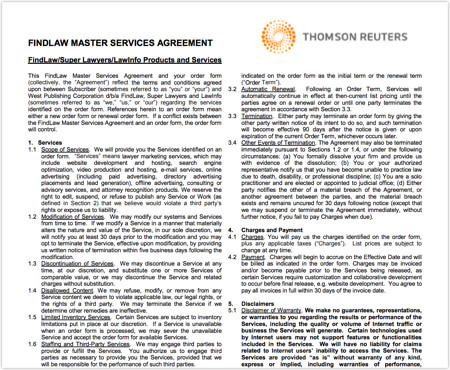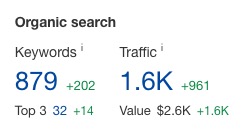What Prospective Clients Need to Know About Hiring FindLaw for Website Design, SEO, and Digital Marketing
FindLaw remains one of the largest providers of law firm SEO, websites, and digital marketing. On its website FindLaw claims to have over 17,000 small law firm clients.
If your firm is currently – or ever has been – in the market for SEO or website marketing services, you’ve likely come across FindLaw.
At Juris Digital we have spoken with dozens of past, current, and prospective FindLaw clients. Between those discussions and our extensive competitive research on FindLaw client websites on behalf of our own clients, we understand the pros and cons of working with FindLaw.
In this post, we’ve done our best to give a useful review of FindLaw’s marketing services. The review is broken down into two parts:
- Practical concerns regarding FindLaw’s administrative processes and requirements and;
- Concerns relating to FindLaw’s SEO and marketing strategies and tactics.
If you are a current FindLaw customer or considering hiring FindLaw, this article is for you.
Disclaimer: FindLaw is one of our top competitors, and as such, we are not an impartial source. Our goal with this FindLaw review is to earn the chance to show you, specifically, why we’re a better choice to be your Firm’s SEO and digital marketing provider.
Practical Concerns About Working with FindLaw
The Infamous FindLaw Service Agreement
By far the most common complaint we hear about working with FindLaw concerns its service agreement.
Specifically, clients say that FindLaw almost always requires a 3-year term, which is nearly impossible to get out of early.

Time and again, we’ve heard from clients who are unhappy with FindLaw’s services and want a new agency but are only a year or 18 months through their contract with FindLaw.
Of course, FindLaw can’t prevent you from engaging with another digital marketing provider, but there is nothing cost-effective about paying two different companies to do the same job.
If you run a small law firm, you understand the importance of flexibility. You may be comfortable signing a 3-year lease on your office, but a 3-year obligation to work with a marketing agency without any legitimate avenues for ending the agreement early? For many small and start-up law firms, that’s a commitment they simply cannot abide.
Here’s the critical thing to understand about FindLaw’s service agreement: FindLaw will enforce the agreement, and they will not hesitate to litigate if you try to leave early.
Don’t expect any good faith or understanding if things aren’t working out; FindLaw will attempt to compel you to pay every last dime required by the service agreement.
Juris Digital’s More Flexible Service Agreement
At Juris Digital, we ask that our clients agree to a commitment of 12 months. Because we focus so heavily on generating new business for our clients through organic channels (like local SEO for lawyers and content marketing), a 12-month term ensures that those efforts can fully bear fruit before the client decides.
Furthermore, we treat our clients how we want to be treated. Though it is rarely the case that clients choose to cancel services before their 12-month term is up, if this is ever the case, we listen to the client to come to an agreement that is fair for both our company and theirs.
Working with Your Top Competitors
Another one of the most common complaints that we hear from FindLaw clients is that FindLaw will work with their top competitors. We recently earned the business of an employment law firm in Glendale, California, who was considering going with FindLaw.
During the sales process, it took us 2 minutes to see that FindLaw was engaged with at least 5 of the Firm’s top local competitors.
While we don’t believe that it’s impossible to achieve strong results for multiple competitors in the same local market and practice area, we do believe that our clients deserve to work with a marketing agency that is not simultaneously working with a dozen competing firms in their city.
Juris Digital’s Limited Competition Policy
At Juris Digital we make the following promise to our clients:
No matter the size of your primary market or your marketing budget, we will never work with more than three competing firms in your area of practice and your market.
Content and Website Ownership
FindLaw’s service agreement makes it incredibly difficult for you to keep the content and the website that you paid for.
FindLaw builds its websites on a proprietary content management system that cannot be transferred to a third party when you part ways in the future. This means that, regardless of your satisfaction with the FindLaw website, “taking it with you” is not an option, as no one else can edit and update the content on the site as you move forward.
As with the term and stringency of FindLaw’s service agreement, the issue with the proprietary system it uses to build and manage your website can be summed up with a single word: inflexibility.
Perhaps this is not as big of a concern for your firm as it is for others, but for a company that professes to provide services for “small law firms,” it seems strange that they would place such little value in granting its clients a baseline level of flexibility.
Juris Digital’s Website and Content Ownership Policy
With us, you will have complete ownership of every digital asset that we produce for you during the course of our engagement. This includes all blog posts, articles, infographics, videos, images, designs, and anything else that’s published on your website.
[ READ: What Makes a Law Firm Website “The Best”? ]
Additionally, we build all of our client’s websites on WordPress, which is the most commonly used content management system in the world. This ensures that should you ever choose another digital marketing provider, you can take your website and all of its contents with you.
Our Primary Concerns About FindLaw’s SEO Tactics and Results
FINDLAW SEO CONCERN #1…
Over-Reliance on FindLaw’s Network of Directory Websites for Lead Generation
One of the advantages of working with FindLaw is that, as a website and SEO client, FindLaw will add you to its network of law firm directory websites, which include sites like:
- Lawyers.Findlaw.com
- SuperLawyers.com
- LawInfo.com
- Abogado.com
Being listed on these directories is beneficial in two ways:
- They provide valuable backlinks and citations which help your website rank better in Google, and;
- They can generate referral leads because the directories themselves rank quite well in Google for relevant keywords.
Because FindLaw a) owns and operates these very powerful lead generation sites and because b) it is cheap to add new clients to them, FindLaw seem to over-rely on them. And why not?
If FindLaw can generate new leads for clients simply by adding their information to a few legal directories, what incentive do they have to execute more advanced SEO and digital marketing activities for law firms, like content marketing and advanced link building?
I know what you’re thinking: So what? If FindLaw can bring me relevant leads, why would I care how it does it?
This is the problem: there are only so many “top-spots” on their directory pages. Not all of their clients can hold a high enough position on the directory pages to see consistent leads.
So what does FindLaw do?
FindLaw waits for you (the client) to express concern over the number of leads you’re getting from the web, and then they move you to the top of the list in the directory. Invariably, you’ll soon start seeing more inquiries. Once you’re placated, another client will make the same complaint, and FindLaw will move that client to the top of the list, and once again your leads will shrink.
Understand that this is not a random assertion. This is something I’ve been told personally by more than half a dozen FindLaw clients.
How our approach to achieving SEO results is different
We believe in investing in marketing initiatives for our clients that will outlast us. That is to say, when our clients decide to leave us (on average, ~3.5 years after starting with us), they will leave with a website that continues to produce consistent and valuable leads.
Let’s say that 90% of the value that FindLaw provides your firm is a result of your listing on its directory sites. When you leave FindLaw, you lose your place on those directories. Essentially, you will have rented web real estate, and once you stop paying rent, that real estate will no longer be yours.
At Juris Digital, we focus on building an online real estate empire for you that will last long after you stop paying us.
FINDLAW SEO CONCERN #2…
Lack-Luster Keyword Targeting and Content Marketing Strategies

In order for law firms to gain maximum exposure to their target clients from organic SEO, they must publish content that is optimized for keywords that their potential clients are searching.
Keyword research is absolutely essential to SEO success. Without conducting strategic keyword research to determine the precise terms that your potential clients are searching on Google, all of your other website efforts will be futile. You can create the most amazing website and content imaginable, but if there is no strategic keyword research behind that content, it will not get you results.
In my experience analyzing FindLaw client websites, one constant that I see is random, unidentified keywords, which signals lack-luster content marketing efforts. It’s true that SEO takes time and that some keywords are more valuable than others, but an utter lack of significant organic search traffic indicates, to me, a lack of strategic keyword research.
We were recently approached by a FindLaw client – a personal injury and workers’ compensation law firm in Maryland – who wanted to understand how we might be able to improve their return on investment. When I used my favorite SEO tool (Ahrefs.com) to analyze their site’s performance, I was shocked by the lack of meaningful traffic:

Remember that FindLaw has been working with this particular client for *years*, not months. The client is paying several thousands of dollars monthly for SEO and web marketing services. The fact that their total organic traffic is valued by this SEO tool at just over $100 is frankly absurd, and it indicates a complete lack of strategic keyword research content marketing.
Let’s look at an example.
The screenshot below shows a recent blog post that was published by FindLaw on behalf of the client in question:
This is a blog post entitled: Stay Safe During Summer Driving. It contains just under 300 words. It has no headings or images. It’s simply four paragraphs of *worthless* content. It gives no actionable or unique insights.
Now, I do see that there is some search volume around the keyword [summer driving tips], but so what? Even if this post gains a high position for this keyword (which it won’t because the content quality is paltry), what purpose will that serve? How will getting traffic from people searching [summer driving tips] help this firm get more clients?
The answer is, it won’t. This type of service simply does not justify the several thousands of dollars per month it’s costing this firm.
How We Achieve Substantial Relevant Organic Search Traffic for Our Clients
As I mentioned above, at Juris Digital we consider keyword research to be absolutely foundational to the success of our clients. When effective keyword research is paired with exceptionally useful and well-optimized content, the sky is the limit in terms of organic search results.
Compare the numbers for the FindLaw client above with the numbers for a Juris Digital client who has been with us for just 8 months and who came to use without an existing website:

While we still have a long way to go with this client, we have been able to rapidly gain valuable organic search traffic by publishing high-quality content based on strategic keyword research.
Further Reading for Understanding Our Approach to Keyword Research and Content Marketing
- [Survey] Do people research their legal issue before hiring a lawyer?
- Evergreen Content Marketing for Law Firms
- Why Lawyers Need an Informational Keyword Strategy
- Using Keyword Data To Increase Traffic
- Keyword Research For Attorneys: From Start to Finish
FINDLAW SEO CONCERN #3…
Vanilla Link Building That is Not Adequate to Achieve Results in 2021
The ability to gain a large number of high-quality backlinks is absolutely essential in ranking your website highly for competitive, valuable keywords. Additionally, the more competitive the industry, the more essential high-quality backlinks become.
If you are in a competitive area like personal injury or criminal defense, you will not get far in SEO without an investment in advanced link building.
In my experience examining the link profiles of FindLaw client websites, I have rarely seen examples of backlinks that are earned through advanced campaigns. Rather, the links I most commonly see result from the simplest, cheapest type of link building: directory submissions.
Make no mistake: directory links are an important component of a well-rounded, robust link profile. But, in almost every case, they are inadequate for gaining high rankings for big-time keywords.
Here’s my guess why FindLaw doesn’t strive to build high-impact links using advanced link-building strategies: It’s really difficult, which means it’s expensive. Whatever the reason, FindLaw appears to shy away from putting adequate investment in their SEO deliverables, and its link-building is no exception.
The Kinds of Links We Build at Juris Digital
We understand that link building is what separates good SEO results from exceptional results. Many SEO agencies and digital marketing providers shy away from link building because it’s difficult and expensive. Not us.
Directory submissions essentially make up the entirety of FindLaw’s link building services. For us, directory submissions are where we start.
Here are some examples of links we’ve earned for our clients recently:
- KXXV.com – Waco among top 10 cities with highest drunk driving fatality rates in Texas
- Jalopnik.com – What Every Driver Should Know About Speeding In Virginia
- CityLab.com – How to Get Home Safely on the Booziest Night of the Year
- KFoxTV.com – El Paso is one of most dangerous Texas cities for 4th of July, study says
- DenverPost.com – The heat is on: DUI patrol increased for the holiday weekend
- Philly.com – The most dangerous Philadelphia intersections in 2015
- WSJ.com – Lawyer Offers Scholarship to Teens Who Admit to Drunk Driving
Summary:
In my opinion, there are four significant drawbacks to hiring FindLaw as your SEO and digital marketing provider:
- Rigid service agreement: FindLaw has 3-year minimum terms and their contracts are very difficult to break. This lack of flexibility is a common pain point that we hear from FindLaw clients.
- Working for your competition: On their website, FindLaw claims to have over 17,000 small law firm clients. It’s almost certain that one or several of those clients are your direct competitors.
- Website ownership: FindLaw builds client websites on a proprietary content management system, which means that once you leave them, you can’t take your website with you.
- Cookie-cutter content and SEO services: Above, I expressed my concerns about FindLaw’s SEO services, specifically criticizing their over-reliance on their own directory listings, their lack-luster keyword research and content marketing, and their basic link building. That critique really gets to the heart of my argument against FindLaw, which is:
FindLaw is an old company with incredible brand recognition. It has the ability to sign new clients based on its name, and to retain old clients by enforcing a stringent contract and by leveraging the powerful legal directories that it operates. To date, FindLaw has had zero incentive to invest in improving the quality of its SEO offering, and so it hasn’t.
